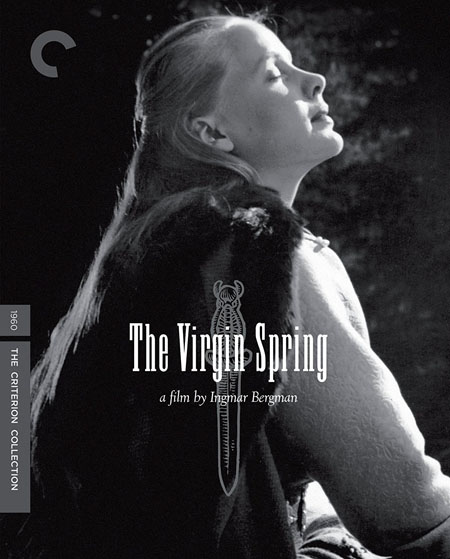
By Raymond Benson
The
Criterion Collection has upgraded its 2006 DVD release of Ingmar Bergman’s
classic Oscar-winning drama, The Virgin Spring, to Blu-ray, and the results are,
naturally, spectacular.
The
film won Bergman his first of three Best Foreign Language Film Academy Awards,
and it can certainly be ranked among the Swedish filmmaker’s best works. Known
as a “rape and revenge tale,†the picture was so influential that it was the
inspiration for Wes Craven’s first horror-exploitation movie from 1972, The
Last House on the Left. Craven took the basic plotline, updated it, and turned
it into a gory (and some would say, sickening) fright fest.
Bergman’s
film is easier to take, but one can imagine how harrowing it might have been in
1960. As a departure for the auteur, Bergman did not write the screenplay himself.
The script was adapted by Ulla Isaksson from a Swedish medieval ballad/legend
called “Töres döttrar I Wänge†(“Töre’s daughters in Vängeâ€). Like The Seventh
Seal before it, the story is set during the Dark Ages. It’s the only other
instance in which Bergman accurately and convincingly depicts this historical
period on film. This time, his visual collaborator is the great cinematographer
Sven Nykvist, who presents the stark, sharp black and white imagery with
crystal clarity.
The
story concerns Christian Töre (Max von Sydow) and his family—his wife, Märeta
(Birgitta Välberg), his teenage daughter Karin (Birgitta Pettersson), the
disturbed, unwed and pregnant servant Ingeri (Gunnel Lindblom), and other
household helpers. One morning, the virginal, innocent, and naïve Karin sets
off on horseback, accompanied by Ingeri, to deliver candles to a church some
miles away. After a frightening, chance encounter with a one-eyed man, Ingeri
separates from Karin, who soldiers on with the candles. She comes upon a motely
trio of creepy herdsmen—all brothers—with whom she offers to share her lunch.
The older two assault Karin, rape, and murder her. The younger brother, who
appears to be around twelve, watches in horror. Ingeri, hidden in the forest,
also witnesses the crime.
Later,
the herdsmen encounter Christian and his family, who are naturally worried
about Karin because she didn’t return home. To reveal what happens next would of
course be a spoiler—just know that Christian must make a hard decision and
summon a strength from within that he didn’t know he had.
It’s
all powerful stuff, and Bergman handles it with harsh realism and surprising
sensitivity. The assault scene is brief, breathtakingly shocking, and surely
something that jolted audiences at the time. Pettersson delivers a particularly
courageous performance, and the actress’ work is the heart of the movie. The
rest of the cast, especially von Sydow, Lindblom, and Välberg, are also
excellent.
Particularly
interesting is that the film can be interpreted as either a deeply religious or
an anti-religious one. Christianity is often a subject matter in Bergman’s oeuvre,
and his disdain for organized religion is usually palpable. In this case,
however, when the titular “virgin spring†appears in the picture, it just might
represent an acknowledgment of a higher power. It’s up to the viewer to decide.
Once
again, the filmmaker recreates on what was surely a very low budget a medieval
world that is totally believable. The attention to detail is striking—P. A.
Lundgren’s production design and Marik Vos’ costume designs bring The Virgin
Spring to life (the latter was nominated for an Academy Award).
Criterion’s
new 2K digital restoration looks gorgeous and is an improvement over the
earlier DVD release. It comes with an uncompressed monaural soundtrack and an
audio commentary from 2005 by Bergman scholar Birgitta Steene. The 2006
supplements are ported over: 2005 interviews with actors Lindblom and
Pettersson, a terrific introduction by director Ang Lee (who claims it was the
first art film he ever saw), and an interesting audio recording of a 1975
American Film Institute seminar by Bergman—in English! There is an alternate
English-dubbed soundtrack, but for my money Bergman films should always be
viewed in the original language. The booklet sports an essay by film scholar
Peter Cowie, reflections on the film by screenwriter Isaksson, and the text of
the original ballad upon which the picture is based.
Among
the many masterpieces that Ingmar Bergman made, The Virgin Spring is a shining
gem. Don’t miss it.
CLICK
HERE TO ORDER FROM AMAZON